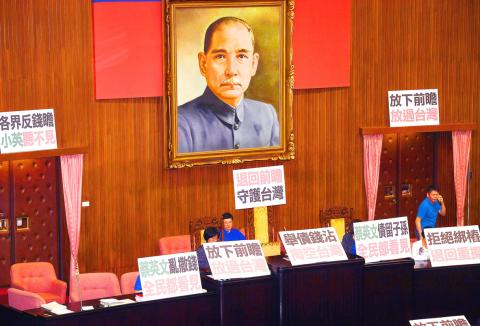The review of a draft act on the government’s Forward-looking Infrastructure Development Program was yesterday stalled as a plenary legislative session saw extended debates with opposition parties demanding that the bill be re-examined.
A cross-caucus negotiation was called immediately after the plenary session began, and the New Power Party (NPP) demanded that the draft act be returned to a legislative committee for reconsideration and that Premier Lin Chuan (林全) and the Cabinet formally report on the infrastructure program to the Legislative Yuan.
The requests were seconded by the Chinese Nationalist Party (KMT) and the People First Party (PFP).

Photo: CNA
NPP Executive Chairman Huang Kuo-chang (黃國昌) said that a formal report by the premier is necessary because it is the Cabinet that should answer for the costly projects, not the ruling Democratic Progressive Party.
The KMT caucus demanded that a feasibility assessment of all the projects be completed before a legislative review.
The DPP refused to return the bill for another round of committee discussions, as it plans to have the bill passed before the end of the extraordinary session tomorrow.
Following hours of cross-caucus negotiations, Legislative Speaker Su Jia-chyuan (蘇嘉全), in an unprecedented move, approved a question-and-answer session for today’s cross-caucus negotiations.
During the session, party caucuses would be able to pose questions to the Cabinet before a clause-by-clause review of the draft act.
The negotiations are scheduled to start at 8:30am, with the NPP, the PFP and the KMT taking turns to question ministers over the program.
“There will still be room for negotiation and ministers would be present at the negotiation for questioning for first time in history,” Su said.
The measure is to make up for the lack of a full legislative debate of the draft act, because it received a committee review on May 15 without its details being debated as the DPP had the bill read out while the KMT caucus was seeking to disrupt the proceedings.
“The draft forward-looking act is not unmodifiable, and changes can be made in terms of construction projects and budgeting,” DPP caucus chief executive Yeh Yi-chin (葉宜津) said.
Meanwhile, during yesterday’s negotiations, KMT legislators occupied the podium in the afternoon to pre-empt the resumption of the legislative session.
KMT Legislator Lin Wei-chou (林為洲) said that the caucus “had their sleeping bags ready” for an overnight occupation of the main chamber of the Legislative Yuan to stall the review of the draft.
Su criticized the KMT caucus, saying the party had broken a cross-caucus agreement of abiding by meeting procedures.
“Who can still believe in the KMT’s honesty? You [the KMT] should swallow your words and apologize to the public,” Su said.

CHAOS: Iranians took to the streets playing celebratory music after reports of Khamenei’s death on Saturday, while mourners also gathered in Tehran yesterday Iranian Supreme Leader Ayatollah Ali Khamenei was killed in a major attack on Iran launched by Israel and the US, throwing the future of the Islamic republic into doubt and raising the risk of regional instability. Iranian state television and the state-run IRNA news agency announced the 86-year-old’s death early yesterday. US President Donald Trump said it gave Iranians their “greatest chance” to “take back” their country. The announcements came after a joint US and Israeli aerial bombardment that targeted Iranian military and governmental sites. Trump said the “heavy and pinpoint bombing” would continue through the week or as long

TRUST: The KMT said it respected the US’ timing and considerations, and hoped it would continue to honor its commitments to helping Taiwan bolster its defenses and deterrence US President Donald Trump is delaying a multibillion-dollar arms sale to Taiwan to ensure his visit to Beijing is successful, a New York Times report said. The weapons sales package has stalled in the US Department of State, the report said, citing US officials it did not identify. The White House has told agencies not to push forward ahead of Trump’s meeting with Chinese President Xi Jinping (習近平), it said. The two last month held a phone call to discuss trade and geopolitical flashpoints ahead of the summit. Xi raised the Taiwan issue and urged the US to handle arms sales to

State-run CPC Corp, Taiwan (CPC, 台灣中油) yesterday said that it had confirmed on Saturday night with its liquefied natural gas (LNG) and crude oil suppliers that shipments are proceeding as scheduled and that domestic supplies remain unaffected. The CPC yesterday announced the gasoline and diesel prices will rise by NT$0.2 and NT$0.4 per liter, respectively, starting Monday, citing Middle East tensions and blizzards in the eastern United States. CPC also iterated it has been reducing the proportion of crude oil imports from the Middle East and diversifying its supply sources in the past few years in response to geopolitical risks, expanding

Pro-democracy media tycoon Jimmy Lai’s (黎智英) fraud conviction and prison sentence were yesterday overturned by a Hong Kong court, in a surprise legal decision that comes soon after Lai was jailed for 20 years on a separate national security charge. Judges Jeremy Poon (潘兆初), Anthea Pang (彭寶琴) and Derek Pang (彭偉昌) said in the judgement that they allowed the appeal from Lai, and another defendant in the case, to proceed, as a lower court judge had “erred.” “The Court of Appeal gave them leave to appeal against their conviction, allowed their appeals, quashed the convictions and set aside the sentences,” the judges